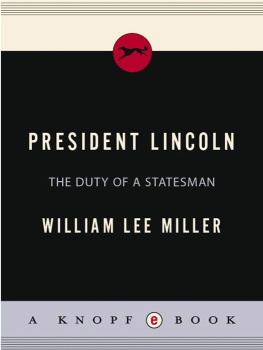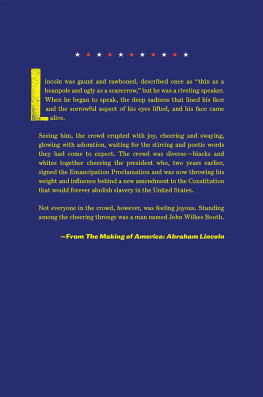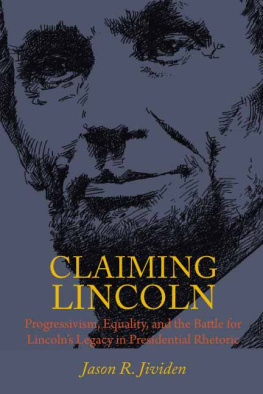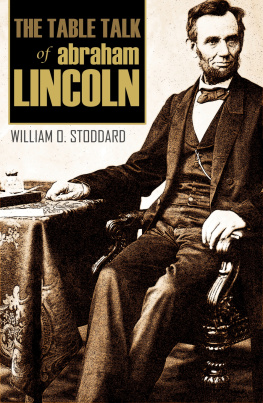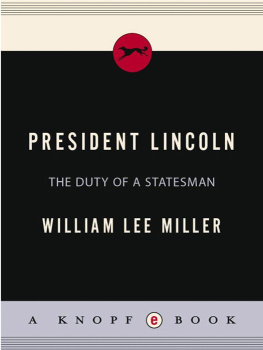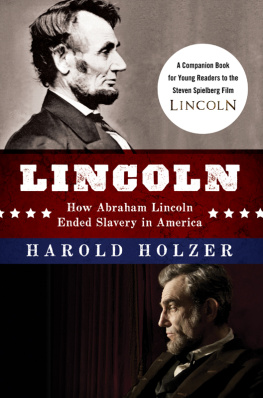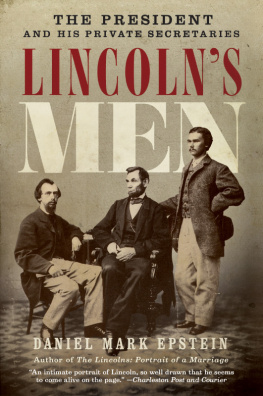
CONTENTS
For Linda
Double strength this time
for reasons she knows
ABOUT THIS BOOK
Statecraft at the highest level is a most exacting human activity, one that presents distinctive moral dilemmas. This book examines the moral performance of Abraham Lincoln in the office of president of the United States. It is therefore indirectly a book about statesmanship and moral choice in the American presidency, through an examination of the conduct of the most remarkable occupant of that office. I wrote an earlier book, Lincolns Virtues: An Ethical Biography, which dealt primarily with Lincoln before he became president. Of course a wit said the next book should be Lincolns Vices. I offer this instead.
There has come to be a huge contradiction in American culture between the stereotyped disdain for politics and politicians on the one side and the celebration, on the other, of Abraham Lincoln. One intention of this book is to correct the stereotype by examining this exemplary figure. The pages that follow tell episodes in President Lincolns story, selectively, in a rough chronological order, dealing with themes as appropriate along the way.
In the immense popular legend and endless outpouring of books about Lincoln, his life story and his personality sometimes seem to displace the role and the accomplishments that made his life story worth telling and his personality worth examining. So let us restate the obvious: he earned his place in the pages of history and in the memory of the world by his deeds and words, by the quality of his life as a national leader, between March 4, 1861, and April 14, 1865, while serving in the office of president of the United States.
PART ONE

INTRODUCTION

Honest Abe Among the Rulers
A T NOON on March 4, 1861, the moral situation of Abraham Lincoln of Illinois was abruptly transformed. That morning, arising in the Willard Hotel at 14th Street and Pennsylvania Avenue in downtown Washington, he had been a private citizen, making choices of right and wrong, better and worse, good and evil, as human beings do, in his own right, for himself, by his own lights, as an individual moral agent. That afternoon, standing on the steps of the East Portico of the Capitol, before thirty thousand of his fellow citizens, he became an oath-bound head of state.
Although he had, in the previous two years, rather rapidly ascended from provincial obscurity to a certain national notice, and although he had in the morning the pendulant importance of a president-elect, he was as yet, so far as the law was concerned, one citizen alongside other citizens. At noon on that day he was transformed by the constitutional alchemy into something elsethe executive of the federal government of the United States, the position that the framers in Philadelphia seventy-four years before had decided to call by the word president. There immediately settled upon his elongated frame an awesome new battery of powers and an immense new layer of responsibility, obligating, constraining, and empowering him.
In that moment he was lifted to a dizzying new eminence. Before many days had passed the sometime backwoods rail-splitter would find himself sending greetings to his great and good friend Her Majesty Doa Isabel II, Queen of Spain; and to his great and good friend Her Majesty Victoria, Queen of the United Kingdom of England and Ireland; and to his great and good friend His Royal Majesty Francis Joseph I, Emperor of Austria, none of whom, of course, he had ever met.
Perhaps you had not thought of Abraham Lincoln of Little Pigeon Creek, Indiana, addressing as his great and good friend His Imperial Majesty Napoleon III, Emperor of the French, or His Majesty Alexander II, Emperor and Autocrat of all the Russias, or His Majesty Leopold, King of the Belgians. But he did. In the years to come there would be many such messages. They would be drafted, to be sure, in the State Department with Secretary of State Sewards name below that of the president, and they would be composed in diplomatic formulae of the utmost insincerity, compared to which U.S. senators calling each other distinguished is a beacon of truthfulness. But they would be signed by your good friend Abraham Lincoln, and sent to royal highnesses and imperial majesties and grand dukes and princes and queens and kings and an occasional president and at least one tycoon and one viceroy. The messages would express the presidents alleged delight with the marriage of a royal niece or the safe delivery of a prince, his supposedly deep sympathy at the melancholy tidings of the decease of a late majesty or the passing of a well-beloved royal cousin, his putative best wishes that a reign might be happy and prosperous. Abraham Lincoln was now a member of this exclusive worldwide circle; he had become, in the pompous formality of international diplomacy, the quite unlikely equal and friend of these august personages around the world because, like them, he was now a head of state.
One can imagine that the lofty figures in high politics in Europe and around the world would find this new American leader a puzzle. He had no family heritage, no education, no languages, no exposure to the great world outside his own country, and he did not know that he should not wear black gloves to the opera. He was not accustomed to ordering people about. He did not insist on deference and did not receive much. He had never been in command of anything except a straggling company of volunteers in the state militia when he was twenty-three, who, it was reported, when he issued his first command told him to go to hell. His only service in national government had been one short and not impressive term as a congressman eleven years earlier. He had not been the executive of anything more than a two-man law firm; he had never in his life fired or dismissed anyone. One knew, because his partys campaign had insisted upon it, that he had once upon a time split some rails, but rail splitting was scarcely a qualification for the role into which he entered in March 1861. He memorized and recited reams of poetry, mostly of a wistful-melancholy sort, which might make one wonder about his grip on practicality. He was reportedly a constant teller of humorous stories, and a man in whom humor was neither incidental nor decorative but integral, in a way that perhaps an emperor might believe should be left to the jester. Would he, on coming into ultimate responsibility, like Shakespeares Prince Hal, turn on his own inner Falstaff and say, I know thee not, old man ? Or would he keep on telling jokes?
The characteristics that would lead his stepmother and his law partner and his friends to call him an unusually good, kind, conscientious man might have added to the world rulers bewilderment, had they known about them. His friends had given him the sobriquet Honest Abe, which might indicate a handicap at the highest level of politics, where a certain amount of patriotic lying is usually thought to be required. Those in Illinois who knew him before he became president said he was an unusually generous human being. He was reported to have more sympathy with the suffering of his fellow creatures than was really advantageous in a rulernot only for lost cats, mired-down hogs, birds fallen out of the nest, but also for his fellow human beings. Stories were told of his springing to the defense of an old Indian who wandered into camp during the Black Hawk War and whom his company wanted to shoot. But a national leader must deal in the hundreds and the thousands and in the realities of the world as it is.
Next page
